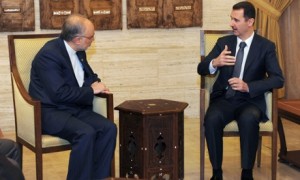 Syria�s embattled regime has arranged a $1bn import credit line from Iran, in a sign of Tehran�s financial support for its ally President Bashar al-Assad as he fights a spreading rebellion, international sanctions and�a crippled economy.
Syria�s embattled regime has arranged a $1bn import credit line from Iran, in a sign of Tehran�s financial support for its ally President Bashar al-Assad as he fights a spreading rebellion, international sanctions and�a crippled economy.The deal between Export Development Bank of Iran and Commercial Bank of Syria was part of broader package of assistance agreed after Wael al-Halqi, Syria�s prime minister, visited Tehran on Wednesday, Syria state television said.
While the agreement is not a direct cash transfer to bolster�Syria�s depleted foreign exchange reserves, it will allow Syrian importers credit to source consumer supplies from Iran at a time when it is hard for them to do so from many other countries.
�It can provide basic goods that Syria has great difficulty procuring elsewhere,� said David Butter, a Middle East financial specialist at Chatham House in London, who added that the deal was �pretty desperate stuff�, as it wasn�t clear Iranian manufacturers could offer many things Syria needed. �Syrians didn�t buy stuff from Iran previously � but at the moment they don�t have much option.�
Iran�s state news agency said Mr Halqi and Mohammad-Reza Rahimi, Iran�s first vice-president, signed a memorandum of understanding over �various fields including economic, trade, political, cultural and health co-operation�. Areas covered included energy transmission and electricity equipment, Syrian state TV said.
Commercial Bank of Syria and Export Development Bank of Iran are both state-owned and both under western financial sanctions, with the US accusing the Iranian bank of �providing or attempting to provide financial services� to Iran�s military organisations.
The credit agreement � an extension of an existing Syria-Iran trade deal � leaves open the question of how Mr Assad�s government is able to continue funding its war machine and government salaries, despite the financial squeeze imposed by western sanctions on oil exports and banking transactions.
Many economic analysts say Syria�s foreign exchange reserves, which stood officially at $17.4bn in May 2011, must have fallen hugely over the past 20 months, in the absence of any outside help. While Adib Mayaleh, Syria�s central bank governor, said in late September that the Damascus government had used less than 10 per cent of the reserves, the Economist Intelligence Unit estimated they would plunge to $4.8bn by the end of last year.
The economic pressure on both the regime and Syrians has been clear from periodic falls in the Syrian pound, which has slid from about 47 before the start of the uprising in March 2011 to 90 last month.
The conflict has also destroyed factories, cut off supply routes and left many private sector business people talking of plunges in sales of between 50 and 90 per cent.
Some of Mr Assad�s enemies say he is receiving funding from allied states, although the Damascus regime denies this. The US this month issued a warning to Russian banks whom it says are still dealing with Syria�s central bank and the Commercial Bank of Syria. Russia has been supplying new Syrian banknotes to Damascus.
Iran is the Assad regime�s staunchest regional ally and is said by analysts to believe the Syrian crisis is a foreign plot masterminded by the US, UK, Saudi Arabia and Qatar to oust the president and ultimately cut Iran�s links with Lebanon�s Hizbollah, its main proxy in the Middle East. This is part of a bigger conspiracy to pave the ground for regime change in Tehran under the pretext of halting Iran�s nuclear programme, the Iranian government says.
By Financial Times
The Iran Project is not responsible for the content of quoted articles.










